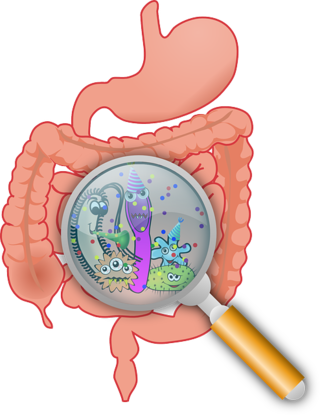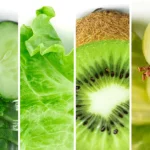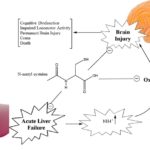Heal The Gut: 17 Gut-Healing Strategies
Enter my friend, Tchicki!
I never thought much about my gut. I’m a psychologist and well-being expert, so I focus mostly on what you can do to boost well-being. But this all changed when my gut completely gave out on me. In the blink of an eye, I started getting nauseous, bloated, and belchy anytime I ate anything. I quickly dropped 15 pounds, became exhausted, and developed intense anxiety.
Had I thought more about my gut health, I could have seen the signs and prevented this nightmare. My gut had been screaming, “Pay attention to me!” for years by giving me new food allergies, migraines, and tummy troubles. These were all signs that my gut was unhealthy… I just didn’t realize it yet.
Why You Want to Heal the Gut Before You Get Sick
When my gut got mad at me, I had no idea what the problem was. It took me months to figure it out. Eventually I took the GI-MAP stool test and learned that I had a parasite called blastocystis hominis (Blasto The Gut Bug), which I likely picked up in Mexico a few years back. I also ate dairy (despite knowing I was sensitive to it), and lived in a moldy apartment—all things that contribute to poor gut health.
Because I ignored the signs, my gut problems snowballed—I developed Small Intestinal Bacterial Overgrowth (SIBO), Estrogen dominance, and an intolerance to dairy, gluten, eggs, and almonds. In addition, I couldn’t eat anything that was difficult to digest (e.g., raw veggies, nuts, popcorn) or anything that fed mold (e.g., mushrooms, grains, even vitamins cased in cellulose capsules).
The GI-MAP stool test also revealed that my gut’s immune system was completely shot. This meant that my body couldn’t clear the toxins in my gut. As a result, I would get so tired that I literally couldn’t keep my eyes open after eating a meal. And when I was awake, I had a hard time concentrating—my foggy brain just could not think. Needless to say, this made it difficult to work and I often skipped eating on days when I needed my brain and body to function.
Knowing what I know now, I would have done just about anything to heal the gut and prevent this. So I feel compelled to share what I’ve learned in hopes that it might help you or someone you know who needs to heal their gut. Read on to learn more.

Do You Need to Heal Your Gut?
Do you have common gut health issues such as: digestive troubles, stomach aches, weight changes, fatigue, skin issues, emotional issues, or food intolerances? Then consider testing the health of your gut and taking action now to heal your gut before your gut issues start to snowball.
If you’d like to know exactly what your gut problems are, you can take a stool test to find out. The GI-MAP stool test even has a report to help you interpret your results.
Get Started
In the section below, I’m going to review a bunch of gut healing strategies. These strategies can be even more effective if you know a bit more about the gut. So let’s start by getting to know your gut bugs.
Get to Know Your Gut Bugs
It turns out that our guts are populated by all sorts of bacteria, fungi, and other unknown critters—these “gut bugs” are collectively referred to as the microbiota.
Just like humans, our gut bugs have personalities which are affected by nature (their genes) and nurture (the environment they live in). As a result, some of them tend to be good guys, some tend to be bad guys, and some can be fickle, and end up being good or bad depending on the circumstances.
For example, some strains of the often-feared E. coli are good for us while other strains are bad. The potentially deadly bacteria, staphylococcus aureus (i.e., staff) is present in 25% of healthy people—it only hurts us when it overgrows. And even good bugs, when there are too many of them, can cause a world of hurt when they move up into the small intestine and overgrow (causing SIBO).
Why does it help to know your gut bugs? Well, because when we understand what leads to an unhealthy society of microbiota, we can take the right steps to create a healthy society of microbiota and heal the gut.
Here’s exactly how to do it.
When you start healing your gut, its best to start by gently supporting and encouraging healthy gut bugs. But if your gut is in a state of distress (as mine was), then you’ll likely need to ramp up slowly to the more harsh gut healing strategies, forcing those gut bullies in your microbiota to “get out!”.
To help you find the right protocol for healing your unique gut, I’ve listed 17 gut-healing strategies below in order from most gentle to most harsh.
I’ve also split these strategies into 3 phases to help you ramp up slowly and effectively.
What to expect
If your gut is unhealthy, it’s going to get worse before it gets better. You’re almost guaranteed to get die-off (Herxheimer) symptoms at some point in the gut healing process.
What are die-off symptoms?
Die-off symptoms can include fatigue, brain fog, gastrointestinal distress such as nausea, gas, bloating, diarrhea or constipation, low-grade fever, headache, sore throat, itching, muscle and joint soreness, chills, flu-like symptoms, lethargy, intense sweet cravings, rashes, and irritability.
Don’t confuse die-off symptoms with a lack of calories or nutrients, which can also make us feel tired and weak. Die-off symptoms tend to come on suddenly (whereas insufficient calories can leave us feeling chronically tired and ill). Some people also find that they have die-off symptoms only at a certain time of the day—morning, afternoon, or evening.
When I started healing my gut, I had intense die-off reactions (chills and nausea) each night for 6 weeks. It decreased to every few days (as I moved through the phases), then once per week, and now very rarely, only when I use one of the more intense strategies below to amp up my detox.
How to minimize die-off
The die-off symptoms you’ll experience will depend on the health of your liver, your gut bugs, and so forth.
- If your die-off symptoms are making you feel miserable, then you’re killing bad gut bugs too quickly. Slow down, support your liver (with supplements like Milk Thistle), take epsom salt baths to support your body’s ability to get those dead gut bugs out of your body as quickly as possible, and eat foods with collagen (e.g., bone broth) to keep the bad stuff in your gut and out of your bloodstream.
- If you feel fine one day and then complete crap the next, you might be getting die-off from parasites. It can be confusing because they have weird lifecycles, they die, reproduce, and create symptoms at weird times.
- If your symptoms are consistently getting worse or staying the same over time, even though you haven’t been adding new gut healing strategies, then it’s likely NOT a result of die-off. See a doctor to make sure your symptoms are not a result of another health issue.
PHASE 1
In this phase, you’ll focus on generally improving your gut health.
1. Decrease Your Stress
It turns out that stress can actually help bad bugs, like Blasto, to thrive—a phenomenon that I experienced first hand.
As I mentioned earlier, my gut switched from okay to completely berzerk in the blink of an eye. The cause of this switch was stress—I had a super stressful month. The stress taxed my immune system even further, enabling Blasto, and a bunch of other bad gut bugs to grow. They moved up into my small intestine (where they are not supposed to be)—and they even started “leaking” out of my gut.
This is how a short period of stress can snowball into major gut health issues. And it’s why creating an anti-stress lifestyle is key to both gut health and mental health.
2. Support Your Immune System
If your gut is unhealthy, your immune system is already churning away trying to heal it. Without proper support, your immune system can get overworked and worn down. So a nice gentle way to heal the gut is to support your immune system in doing its job.
To support your immune system, you can eat immunity supporting foods, like citrus fruits, garlic, and spinach. If your immune system is already weak, it can also be helpful to supplement with key vitamins and minerals that may have become depleted like, Vitamin B, Vitamin D, and Zinc. I also found that taking vitamins to support adrenal function was incredibly helpful as adrenals can get taxed when we are overstressed by gut health issues.
3. Reduce Inflammation
Another way to heal the gut is by removing inflammatory foods. This helps your immune system decrease it’s workload so it can spend more energy on healing the gut.
Although each of us have different problem foods, wheat and dairy tend to be problematic for many people with gut health issues. Sugar feeds many bad bacteria (all carbs are digested as sugar). And partially-hydrogenated oils are toxic, so they busy the immune system leaving other problems in your body unaddressed. That’s why it can be really helpful to remove these inflammatory foods if we want a healthy gut.
4. Consume Collagen
Collagen makes up the gut’s connective tissue—or the barrier between what’s in your gut and the rest of your body. If this barrier gets “leaky”, particles from the gut can seep into the bloodstream, causing everything from the herxheimer reaction (flu-like symptoms), to mental health issues, to autoimmune disease.
Consuming collagen is likely helpful for everyone, but especially those with an unhealthy microbiota. In general, those with gut-health issues tend to have low levels of collagen. In addition, your microbiota affect which symptoms (or diseases) you might get from a leaky gut. So if you have an unhealthy gut, leaky gut may be more problematic.
For example, research shows that one type of autoimmune arthritis called Ankylosing Spondylitis is caused by the bacteria, Klebsiella. Many of us have Klebsiella in our microbiome, so researchers hypothesize that’s it’s only when these bacteria “leak” into our bloodstream that they cause arthritis. So eating collagen (or high-collagen foods like bone broth) can potentially prevent these negative outcomes.
5. Eat Gut-Soothing Foods
We often eat with little consideration for what our gut must then do with our food. In fact, our guts must break down all the chunks, absorb the nutrients, and then push along the indigestible fiber to feed the gut bugs in the lower intestine—that’s a lot of work for an unhealthy gut.
To help ease the burden on the gut, we can eat gut-soothing foods such as soft foods, cooked foods, and juiced fruits and vegetables. These foods are already broken down, which helps ease the burden on the gut.
6. Focus on Macronutrients
When it comes to the role of macronutrients (i.e., Carbs, Protein, and Fat) in gut health, the experts are split. Some say that feeding our gut bugs with carbs like fiber, vegetables, and fruits is the best approach. Others say that starving our gut bugs by eating primarily fat is the best approach. Indeed, both approaches seem to have benefits… depending on your unique gut and microbiota. So it’s important to pay attention to how specific foods make you feel.
For some folks, consuming fiber can exacerbate gut issues (e.g., those with an overgrowth of firmicutes). For others, certain types of carbs exacerbate gut issues. For others, consuming high-fat meals exacerbate gut health issues (e.g., those without the enzymes to break down fats). When it comes to your gut health, the key is to eat mindfully and explore how different foods make you feel. Only then can you know that you’re eating to heal your gut.
PHASE 2
If the tips in Phase 1 aren’t resolving your gut health issues, move on to Phase 2. In this phase, you’ll focus on more nuanced strategies to improve gut health.
7. Try a Ketogenic Diet
Although a Ketogenic diet doesn’t seem to work for everyone, it appears to be a good way to reduce inflammation in the body more generally, improve insulin resistance, and clear gunk from the cells. It’s also tends to be good for getting rid of bad bacteria and parasites. Why? Because the Ketogenic diet is a low-carb diet, and gut bugs primarily eat carbs.
Keep in mind that starting a Ketogenic diet can often result in a few days or weeks of Keto flu—headaches, leg cramps, sugar cravings, and some other annoying symptoms. To prevent Keto flu, make sure you’re getting electrolytes (especially sea salt, magnesium, and potassium). An easy way to do this is by drinking homemade “ketorade”.
And if you don’t feel good eating Keto after a few days, stop! If your body is already stressed, Keto can be too stressful for your body to handle. You might instead opt for a moderate to low carb diet just to reduce your sugar intake.
8. Detox The Liver
Our livers are responsible for detoxing us of the harmful byproducts of dying gut bugs. Eating liver supportive foods can help us reduce die-off reactions and kill bad gut bugs with more ease.
To help the liver and body detox, consider taking milk thistle supplements, calcium D-Glucarate, NAC, or liposomal glutathione. Next, eat bitter greens like dandelion leaves, raw radishes, and mustard greens to promote more bile excretion and process toxins effectively. And be sure to eat cruciferous veggies like broccoli, kale, collard greens, bok choy, and arugula. These contain diindolylmethane (DIM), a substance that helps the liver detox effectively.
9. Take Natural Digestive Aids
If your gut is having a hard time digesting, for whatever reason, help it out by consuming natural digestive aids.
- Betaine HCL and Apple Cider Vinegar are helpful for folks with insufficient stomach acid to break down food (common signs of this are heartburn or upset stomach).
- Digestive enzymes are helpful for folks with a sluggish gallbladder or pancreas.
- And ginger is helpful for those with sluggish migrating motor complex (MMC), which helps clean out the small intestine between meals.
10. Eat Less to Starve Gut Bugs
If you have an overgrowth of bad gut bugs, part of the goal is to starve them without starving yourself. Some folks advocate for fasting, intermittent fasting, or eating fewer carbs to reduce bacteria like firmicutes, which have been shown to be linked to obesity. Just be sure you’re consuming enough calories not to stress your body out.
11. Remove Toxins from Your Life
Sometimes it seems like we are doing everything right, but we still can’t seem to get a handle on our gut health issues. In this case, there is often some hidden toxin that’s bogging down our immune system.
For example, are we eating all of our food out of plastic with BPA, a known gut toxin? Or are we living in a home that’s covered in gut-harming mold? Or are we sleeping on a new bed that sprayed in toxic flame-retardant chemicals?
Gut-harming toxins are all around us. The electromagnetic waves from our smartphones can even mess with our guts. So finding and removing these toxins is often instrumental in healing the gut.
PHASE 3
If the tips in Phase 1 and 2 aren’t resolving your gut health issues, your gut bugs just aren’t going to go quickly into the night—now it’s time for war! In this phase, you’ll focus on evicting unhealthy gut bugs from your body… by force.
12. Break Up the Biofilms That House Bad Gut Bugs
When bad gut bugs just won’t leave, it’s often because they have a protective home, or biofilm, to hide in. Taking biofilm disrupting supplements can start to jar them loose. The biofilm disrupters include:
- Allicin (from Garlic)
- N-acetyl cysteine (NAC)
- Monolaurin (from coconut oil)
13. Eat Probiotic Foods
Consuming probiotic foods is probably the best thing you can do for gut health. Although probiotic supplements can be helpful, they are usually too small to make much of an impact. If you do want to try pills, get pills with 50 billion colony forming units (CFUs). I suggest the probiotic Saccharomyces boulardii, which has been shown to combat digestive issues.
The reason I include this strategy in Phase 3 instead of Phase 1 is because probiotics can often be intense and cause bad die-off symptoms. So, how do you add probiotics to your diet successfully? Try the sauerkraut protocol.
The Sauerkraut protocol
Buy a jar of sauerkraut. Be sure that the jar is refrigerated, has live cultures, and doesn’t include any preservatives whatsoever. Here is a handy guide to help you find the right stuff.
Consume 1 tablespoon of sauerkraut with a meal. Pay attention to how you feel. If you feel die-off symptoms (I did!) then keep eating this small amount once per day until it doesn’t feel bad anymore. If you feel fine with the amount of kraut, go to the next step.
Increase the amount of sauerkraut you eat by 1 tablespoon per meal. Keep paying attention to how you feel to keep die-off symptoms to a minimum. And keep increasing your dosage until you get to 1/2 cup sauerkraut per meal. Make sure you don’t go too fast or you’ll kill too many bad bugs and feel like absolute garbage.
Continue this slow-build process with other probiotic foods. Once you tolerate sauerkraut, try kimchi, coconut yogurt, kefir (if you tolerate dairy), coconut kefir, kvass, kombucha, fermented fruit, and so forth until you can eat as many fermented foods as you desire without any symptoms.
Make your own fermented foods. Once you tolerate store-bought fermented foods, ideally, you should make your own fermented foods. These are far higher in probiotics and have a bigger positive impact on your gut.
When I did the sauerkraut protocol, it took me about 6 weeks to get through step 3 and about 2 months to get through all the steps. But everyone is different.
14. Eat Anti-Bacterial Foods
Probiotics crowd out bad bacteria; anti-bacterials kill bad bacteria. To eradicate stubborn bad gut bacteria, try taking some anti-bacterial herbs.
Some experts recommend you start with less aggressive anti-bacterials like cinnamon, clove, or garlic. Test each of these a little at a time to see how they make you feel. If these don’t help, try more intense anti-bacterials like oregano oil, olive leaf, berberine, or grapefruit seed extract in small doses. That stuff is powerful!
15. Eat Anti-Parasitic Foods
One great, and cheap, way to find out if you have parasites is with anti-parasitic foods, specifically, papaya seeds. You can even test yourself for parasites at home with the papaya seed test.
The papaya parasite test
Make a papaya smoothie. Toss 1/2 of a papaya in a blender (or less if you prefer). Toss in all the papaya seeds from that half of the papaya. Feel free to add a little juice or water if you like a thinner smoothie.
Drink the smoothie on an empty stomach. Don’t eat anything else for 3 hours (water is fine). This should be enough time for the papaya seeds to get through your small intestine. Pay attention to how you feel. If you get any die-off symptoms, then you might have parasites, and the papaya seeds have just made them angry.
If you get any die-off symptoms (like fatigue, brain fog, gastrointestinal distress such as nausea, gas, bloating, diarrhea or constipation, low-grade fever, headache, sore throat, itching, muscle and joint soreness, chills, flu-like symptoms, lethargy, intense sweet cravings, rashes, and irritability), get a parasite test to find out for sure (the papaya parasite test isn’t a sure thing). This is also necessary to see which parasites you have if you do have them.
16. Eat Anti-Fungal Foods To Kill Gut Candida and Yeast
Just as papaya seeds kill parasites, anti-fungal foods kill gut fungi like candida. A great, and cheap, way to find out if you have problems with gut fungi is with the coconut oil test.
The coconut oil test
Eat 1 tablespoon virgin coconut oil on an empty stomach. Don’t eat anything else for 1-2 hours (water is fine). Pay attention to how you feel.
If you feel die-off symptoms then keep eating this amount of coconut oil (or less) until it doesn’t feel bad anymore. If you feel fine, go to the next step.
Increase the amount of coconut oil you eat by just a tiny bit per day. Keep paying attention to how you feel. Keep increasing your dosage until you get to 2-3 tablespoons of coconut oil per day (you can include this oil in food if that’s easier, but it might not be as effective).
17. Combine Anti-Microbial Supplements
Since we don’t know which approaches and which herbs will work best on our unique gut bugs, it’s helpful to combine different herbs to see which ones work best for us. Here’s a few more anti-microbial herbs to explore. But follow the directions carefully; these are potent herbs.
- Wormwood
- Cloves
- Black walnut
- Pau de acro
The Silver Lining
Although I’m not happy that I got sick, I am grateful that I now have the opportunity to become truly well. And on a personal note, this whole experience has made me realize that all we have are these moments. At any point, we can end up sick and lose them all. Now that I’m on the mend, I see the silver lining of all this—I’m a bit more grateful for small things (like breathing and digestion) and strive to live my life with more purpose.



